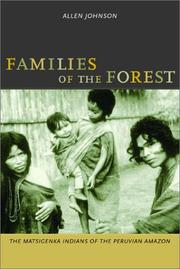| Listing 1 - 1 of 1 |
Sort by
|

ISBN: 1282762591 159734611X 9786612762598 0520936299 9780520936294 0585466033 9780585466033 9781597346115 9781282762596 6612762594 0520232410 9780520232419 0520232429 9780520232426 Year: 2003 Publisher: Berkeley University of California Press
Abstract | Keywords | Export | Availability | Bookmark
 Loading...
Loading...Choose an application
- Reference Manager
- EndNote
- RefWorks (Direct export to RefWorks)
The idea of a family level society, discussed and disputed by anthropologists for nearly half a century, assumes moving, breathing form in Families of the Forest. According to Allen Johnson's deft ethnography, the Matsigenka people of southeastern Peru cannot be understood or appreciated except as a family level society; the family level of sociocultural integration is for them a lived reality. Under ordinary circumstances, the largest social units are individual households or small extended-family hamlets. In the absence of such "tribal" features as villages, territorial defense and warfare, local or regional leaders, and public ceremonials, these people put a premium on economic self-reliance, control of aggression within intimate family settings, and freedom to believe and act in their own perceived self-interest. Johnson shows how the Matsigenka, whose home is the Amazon rainforest, are able to meet virtually all their material needs with the skills and labor available to the individual household. They try to raise their children to be independent and self-reliant, yet in control of their emotional, impulsive natures, so that they can get along in intimate, cooperative living groups. Their belief that self-centered impulsiveness is dangerous and self-control is fulfilling anchors their moral framework, which is expressed in abundant stories and myths. Although, as Johnson points out, such people are often described in negative terms as lacking in features of social and cultural complexity, he finds their small-community lifestyle efficient, rewarding, and very well adapted to their environment.
Machiguenga Indians --- Machiguenga cosmology. --- Amachengue Indians --- Macheyenga Indians --- Machiganga Indians --- Manaries Indians --- Mashigango Indians --- Matshingenga Indians --- Matsigenga Indians --- Ugunichire Indians --- Indians of South America --- Cosmology, Machiguenga --- Cosmology --- Social life and customs. --- Kinship. --- Amazon River Region --- Amazonia --- amazon rainforest. --- anthropologists. --- anthropology. --- cultural anthropology. --- cultural framework. --- cultural social. --- discussion books. --- economic self reliance. --- ethnographers. --- ethnography. --- family level society. --- family settings. --- forest life. --- harsh conditions. --- household economy. --- indigenous peoples. --- matsigenka indians. --- native indians. --- nonfiction. --- peru. --- peruvian amazon. --- self reliance. --- social sciences. --- social studies. --- social units. --- sociocultural perspective. --- textbooks. --- theoretical. --- Jews --- Historical fiction --- History --- Identity --- History and criticism. --- Third Book of Maccabees --- Criticism, interpretation, etc.
| Listing 1 - 1 of 1 |
Sort by
|

 Search
Search Feedback
Feedback About UniCat
About UniCat  Help
Help News
News